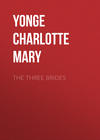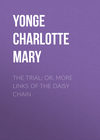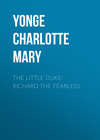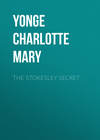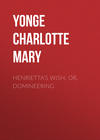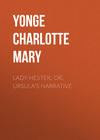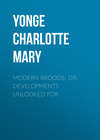Czytaj książkę: «The Three Brides», strona 25
The eager glance seemed to dart at him. “Julius Charnock!” she cried, “come!” and as he would have said some word about her health, she cut him short: “Never mind that; I must speak while my brain serves. After that be the priest. He is dead!”
“My brother? Yes.”
“The only one I ever loved! There’s no sin nor scandal in saying so now. His wife is better? It will never kill her.”
“She does not know.”
“No? There was nothing to make her. He could not give her his heart, try as he would. Why did he turn the unchangeable to hate! hate! hate!”
“Lady Tyrrell, you did not send for me to hear what ought not to be said at all?”
“Don’t fly off,” she said. “I had really something to say. It was not wholly hate, Julius; I really tried to teach his little idiot of a wife to win him at last. I meant it to turn out well, and nothing could, with that mother there.”
“I must leave you, Lady Tyrrell, if you will not control yourself.”
“Don’t be hard on me, Julius,” and she looked up with a glance of better days. “You idolize her, like all the rest of you; but she chilled me and repelled me, and turned me to bitterness, when I was young and he might have led me. Her power and his idolatry made me jealous, and what I did in a fit of petulance was so fastened on that I could not draw back. Why did not he wait a little longer to encumber himself with that girl! No—that wasn’t what I had to say—it’s all over now. It is the other thing. How is Frank?”
“Very ill indeed; but quieter just now.”
“Then there shall not be another wreck like ours. Lena, are you here? You saw that Frank had let Constance Strangeways win your pebble. It was because I showed him the one Beatrice bought, and he thought it yours. Yes, I saw nothing else for it. What was to become of the property if you threw yourself away, and on her son?” she added, with the malignant look. “Whether he knew of this little vow of yours, I can’t tell, but he had lost his head and did for himself. It was for your good and papa’s; but I shall not be here to guide the clue, so you must go your own way and be happy in it, if she will let you. Father, do you hear? Don’t think to please me by hindering the course of true love; and you, Julius, tell Frank he was ‘a dull Moor.’ I liked the boy, I was sorry for him; but he ought to have known his token better;—and there was the estate to be saved.”
“Estates weigh little now!”
“Clerical! I suppose now is the time for it? You were all precision at Compton. It would kill me; I can’t live with Mrs. Poynsett. No, no, Tom, I can’t have old Raymond quizzed; I’ll get him out of it when the leading-strings are cut. What right has she—?”
The delirium had returned. Julius’s voice kept her still for a few moments, but she broke out afresh at his first pause, and murmurs fell thick and fast from her tongue, mixing the names of her brother and Raymond with railings at Mrs. Poynsett for slights in the days when the mother was striving to discourage the inclination that resulted in the engagement.
Earnestly did Julius beseech for peace, for repentance for the poor storm-tossed soul; but when the raving grew past control, and the time was coming for his ministrations to the Vicar of Wil’sbro’, he was forced to leave her. Poor old Sir Harry would have clung to him as to anything like a support, but Eleonora knew better. “No, dear papa,” she said, “he has given us too much of his time already. He must go where he can still help. Poor Camilla cannot attend to him.”
“If she came to herself—”
“Then send for me. I would come instantly. Send to the town-hall any time before twelve, after that to Compton. Send without scruples, Lenore, you have truly the right.”
They did not send, except that a note met him as he returned home, telling him that suffusion of the brain had set in. Camilla Tyrrell did not survive Raymond Poynsett twelve hours.
CHAPTER XXX
Come Back
And are ye sure the news is true?
And are ye sure he’s weel?
—J. THOMPSON
Eleonora Vivian was striving to write her sorrowful announcements in the deepening dusk of that autumn evening, while her father had shut himself up after his vigil to sleep under Victor’s care, when a message came that Lady Rosamond Charnock earnestly begged to see her. She stood with a face white and set, looking like a galvanized corpse, as her lips framed the words, “He is dead!”
“No!” almost screamed Rosamond, snatching her hand. “No! But no one can save him but you. Come!”
Without a word, Eleonora stepped into her own room, and came back in cloak, hat, and veil.
“Right,” said Rosamond, seizing her arm, and taking her to the pony-carriage at the door, then explaining while driving rapidly: “He has left off raving ever since his mother has been with him, but he lies—not still but weak, not speaking, only moaning now and then. His throat is so dreadful that it is hard to give him anything, and he takes no notice of what one says, only if his mother takes the spoon. He gets weaker, and Dr. Worth says it is only because there is no impulse to revive him—he is just sinking because he can’t be roused. When I heard that, I thought I knew who could.”
Eleonora’s lips once moved, but no sound came from them, and Rosamond urged her little pony to its best speed through the two parks from one veiled house to another, fastened it to the garden-door without calling any one, and led her silent companion up the stairs.
Mrs. Poynsett felt a hand on her shoulder, and Rosamond said, “I have brought our only hope,” and Eleonora stood, looking at the ghastly face. The yellow skin, the inflamed purple lips, the cavernous look of cheeks and eyes, were a fearful sight, and only the feeble incessant groping of the skeleton fingers showed life or action.
“Put this into his hand,” said Rosamond, and Lenore found the pebble token given to her, and obeyed. At the touch, a quivering trembled over face and form, the eyelids lifted, the eyes met hers, there was a catching of the breath, a shudder and convulsive movement. “He is going,” cried his mother, but Anne started forward with drops of strong stimulant, Rosamond rubbed spirit into his forehead, the struggle lessened, the light flickered back into his brown eyes, his fingers closed on hers. “Speak to him,” said Mrs. Poynsett. “Do you see her, Frankie dear?”
“Frank! dear Frank, here I am.”
The eyes gazed with more meaning, the lips moved, but no sound came till Anne had given another drop of the stimulant, and the terrible pain of the swallowing was lessened. Then he looked up, and the words were heard.
“Is it true?”
“It is, my dear boy. It is Lena.”
“Here, Frank,” as still the wistful gaze was unsatisfied; she laid her hands on his, and then he almost smiled and tried to raise it to his cheeks, but he was too weak; and she obeyed the feeble gesture, and stroked the wasted face, while a look of content came over it, the eyes closed, and he slept with his face against her hand, his mother watching beside with ineffable gratitude and dawning hope.
Lenore was forgetting everything in this watching, but in another quarter of an hour Anne was forced again to torture him with her spoon; but life was evidently gaining ground, for though he put it from him at first, he submitted at Lena’s gesture and word. She felt the increased warmth and power in his grasp, as he whispered, “Lena, you are come back,” then felt for the token.
Alas! that she must leave him. They knew she must not stay away from her father; indeed, Rosamond had told no one of her attempt, her forlorn hope. Lena tried to give assurances that she only went because it could not be helped, and the others told him she would return, but still he held her, and murmured, “Stay.” She could not tear herself away, she let him keep her hand, and again he dozed and his fingers relaxed. “Go now, my dear,” said Mrs. Poynsett, “you have saved him. This stone will show him that you have been here. You will come back to-morrow, I may promise him?”
“Yes, yes. In the morning, or whenever I can be spared,” whispered Lena, who was held for a moment to Mrs. Poynsett’s breast, ere Rosamond took her away again, and brought her once more down-stairs and to the pony-carriage. There she leant back, weeping quietly but bitterly over the shock of Frank’s terribly reduced state, which seemed to take from her all the joy of his revival, weeping too at the cruel need that was taking her away.
“He will do now! I know he will,” said Rosamond, happy in her bold venture.
“Oh! if I could stay!”
“Most likely you would be turned out for fear of excitement. The stone will be safer for him.”
“Where did that come from?” asked Lenore, struck suddenly with wonder.
“I wrote to Miss Strangeways, when I saw how he was always feeling, feeling, feeling for it, like the Bride of Lammermoor. I told her there was more than she knew connected with that bit of stone, and life or death might hang on it. Then when I’d got it, I hardly knew what to do with it, for if it had soothed the poor boy delirious, the coming to his right mind might have been all the worse.”
Rosamond kissed her effusively, and she dreamily muttered, “He must be saved.” There was a sort of strange mist round her, as though she knew not what she was doing, and she longed to be alone. She would not let Rosamond drive her beyond the Sirenwood gate, but insisted on walking through the park alone in the darkness, by that very path where Frank had ten months ago exchanged vows with her.
Rosamond turned back to the Hall. It was poor Cecil’s pony-carriage that she was driving, and she took it to the stable-yard, where her entreaty had obtained it from the coachman, whom she rewarded by saying, “I was right, Brown, I fetched his best doctor,” and the old servant understood, and came as near a smile as any one at Compton could do on such a day.
“Is the carriage gone for Mr. Charnock?”
“Yes, my lady, I sent Alfred with it; I did not seem as if I could go driving into Wil’sbro’ on such a day.”
Rosamond bade a kind farewell to the poor old coachman, and was walking homewards, when she saw a figure advancing towards her, strangely familiar, and yet hat and coat forbade her to believe it her husband, even in the dusk. She could not help exclaiming, “Miles!”
“Yes!” he said, coming to a standstill. “Are you Rosamond?”
“I am;—Anne is quite well and Frank better. Oh! this will do them good! You know—”
“Yes—yes, I know,” he said hastily, as if he could not bear to let himself out to one as yet a stranger. “My mother?”
“Absorbed in Frank too much to feel it yet fully; Anne watches them both. Oh! Miles, what she has been!” and she clasped his hand again. “Let me call her.”
And Rosamond opened the hall door just as some instinct, for it could hardly have been sense of hearing, had brought Anne upon the stairs, where, as Miles would have hurried up to her, she seemed, in the light gray dress she still wore, to hover like some spirit eluding his grasp like the fabled shades.
“Oh no! you ought not. Infection—I am steeped in it.”
“Nonsense,” and she was gathered into the strong grasp that was home and rest to her, while Miles was weeping uncontrollably as he held her in his arms. “O, Nannie, Nannie! I did not think it would be like this. Why did they keep me till he was gone? No, I did not get the telegram, I only heard at the station. They let me go this morning, and I did think I should have been in time.” He loosed himself from her, and hung over the balustrade, struggling with a strong man’s anguish, then said in a low voice, “Did he want me?”
“He knew it was your duty,” said Anne. “We all were thankful you were kept from infection, and he said many little things, but the chief was that he trusted you too much to leave any special messages. Hark! that must be Mr. Charnock, Cecil’s father! I must go and receive him. Stay back, Miles, you can’t now—you know my room—”
He signed acquiescence, but lingered in the dark to look down and see how, though Rosamond had waited to spare them this reception, his wife’s tall graceful figure came forward, and her kindly comforting gestures, as the two sisters-in-law took the newcomer into the drawing-room, and in another minute Anne flitted up to him again. “That good Rosamond is seeing to Mr. Charnock,” she said; “will you come, Miles? I think it will do your mother good; only quietly, for Frank knows nothing.”
Mrs. Poynsett still sat by Frank. To Miles’s eyes he was a fearful spectacle, but to Anne there was hourly progress; the sunken dejected look was gone, and though there was exhaustion, there was rest; but he was neither sleeping nor waking, and showed no heed when his brother dropped on one knee by his mother’s side, put an arm round her waist, and after one fervent kiss laid his black head on her lap, hiding his face there while she fondled his hair, and said, “Frank, Frankie dear, here’s Miles come home.” He did not seem to hear, only his lips murmured something like ‘Anne,’ and the tender hand and ready touch of his unwearied nurse at once fulfilled his need, while his mother whispered, “Miles, she is our blessing!”
Poor Miles! Never had sailor a stranger, though some may have had an even sadder, return. He had indeed found his wife, but hers was the only hand that could make Frank swallow the sustenance that he needed every half-hour, or who knew how to relieve him. Indeed, even the being together in the sick-room was not long possible, for Anne was called to the door. Mr. Charnock was asking to see Mrs. Poynsett. Would Mrs. Miles come and speak to him?
Mr. Charnock was a small and restless man with white hair, little black eyes, looking keener than they were, and a face which had evidently been the mould of Cecil’s. He was very kind, with a full persuasion that the consolations of his august self must be infallible; but this was coupled with an inclination to reprove everybody for the fate that had left his cherished darling a childless widow at two-and-twenty. To take him to Frank’s room was impossible, and he had to be roundly told so. Neither had he seen his daughter. She was very weak, but recovering, and Grindstone, whom he had seen and talked with, was as strenuous in deprecating any excitement as he was nervous about it. So he could only be disposed of in his room till dinner-time, when he came down prepared to comfort the family, but fulfilled his mission rather by doing such good as a blister, which lessens the force of the malady by counter-irritation.
Julius came up to be with Miles, and to help them through the dinner, the first which had been laid for many a long day. His enquiry for Cecil was answered: “She is progressing as favourably as there can be reason to expect, but I have not seen her. I follow the judgment of her faithful Grindstone.”
“Then she still knows nothing—”
“Of her bereavement? No. Her state does not yet warrant it. In fact, I almost wish I had obeyed my original impulse, and brought down Venn to make the melancholy communication.”
To every one’s surprise Anne bristled up, saying, “Why, here is Julius, Mr. Charnock!”
Mr. Charnock bowed: “I understand that my Cousin Julius has been engrossed by his wife’s family and by the adjoining parish, the care of which he has assumed.”
Anne fairly coloured up, and exclaimed, “Julius has been our main-stay and help in everything—I can’t think how he has done it. He has been here whenever we needed him, as well as at Wil’sbro’, where people have been dying everywhere, the poor Vicar and all—”
“Far be it from me to discourage philanthropy,” said Mr. Charnock, “only I would have it within due bounds. I am an old-fashioned squire, of a school, it may be, antiquated, an advocate of the parochial system; and I cannot help thinking that if this had been closely adhered to by hot-headed young clergymen, my poor child might not have been a childless widow at two-and-twenty.”
Julius was too much tired and too sad-hearted to heed greatly what Mr. Charnock said. It was so strange to have Miles in sight, yet to feel so unable to be glad, that he scarcely heard anything. But Anne again took up the cudgels: “Mr. Charnock, you don’t suppose that it was anything Julius did that brought this fever here. It was going to the town-hall among the drains.”
“My dear Mrs. Miles Charnock, I am sure your husband will agree with me that sanitary arrangements and all connected with them are beyond the range of ladies, who are happily exempted from all knowledge of the subject.”
Anne could not say aloud that she wished Cecil had held this opinion, but she subsided, while Mr. Charnock prosed on, asking questions about the arrangements, and seeming shocked to hear that the funeral must be early the next day, this being one of the prime injunctions of the doctors, and that the one had been asked to attend it. It made him sigh again for his poor daughter, as he handed Anne in to dinner. She did not stay half through it, for it was again the time for feeding Frank. Miles went half way up-stairs with her and returned, looking very wistful. Julius smiled at him, “Your wife is too valuable, Miles; she is every one’s property.”
“It must be very gratifying to you,” added Mr. Charnock, “to find how example and superior society have developed the native qualities your discernment detected in the charming young lady who has just quitted us. It was a most commendable arrangement to send her to enjoy the advantages of this place.”
“I sent her to be a comfort to my mother,” said Miles, bluntly.
“And so she has been,” said Julius, fervently, but sotto voce.
“I understand,” said Mr. Charnock; “and as I was saying, my dear Cecil expressed from the first her desire to assist in forming her stranger sister-in-law, and I am happy to see the excellent effect. I should scarcely have guessed that she came from a colony.”
“Indeed,” Miles answered dryly.
Mr. Charnock might have it his own way, if he liked to think Anne had been a Hottentot till Cecil reclaimed her.
The two brothers did feel something like joy when a message at last informed Mr. Charnock that his daughter was awake and he might see her. They drew nearer together, and leant against one another, with absolute joy in the contact. They were singularly alike in outline, voice, and manner, in everything but colouring, and had always been one in spirit, except for the strong passion for adventure which had taken Miles to sea, to find he had chosen his profession too young to count the cost, and he held to it rather by duty than taste. Slight as had been his seniority, poor Raymond had always been on a sort of paternal pinnacle, sharing the administration with his mother, while Miles and Julius had paired on an equality.
“Poor mother!” sighed Miles. “How is she to live without him? Julius, did he leave any word for me with you?”
“Above all, that Anne is the daughter for my mother, and so she is.”
“What, when this poor wife of Raymond’s was said to be the superior creature?”
“You see her adoring father,” said Julius. “My Rose has necessarily her own cares, but Anne has been my mother’s silent aid and stay for months, and what she has been in the present need no words can say. My mother has had no power to take the direction of anything, her whole being has been absorbed, first in Raymond, now in Frank; and not only has Anne been Frank’s constant nurse through these five weeks of the most frightful fever and delirium I have seen at all here, but she has had thought for all, and managed all the house and servants. We could do comparatively little, with Rose’s brother ill at home, and the baby so young; besides, there have been eleven cases in the parish; and there was Wil’sbro’—but Anne has been the angel in the house.”
“I knew—I knew she would be everything when once the first strangeness was over; but, poor girl, her heart is in Africa, and it has been all exile here; I could see it in every letter, though she tried to make the best of it. If there had but been a child here!”
“I think you will find sufficient attachment to mother to weigh a good deal with her. Poor Anne, she did think us all very wicked at first, and perhaps she does still, but at least this has drawn us all nearer together.”
And then the brothers lowered their voices, and Miles heard the full history of Raymond’s last illness, with all the details that Julius could have spoken of to none else, while the sailor’s tears slowly dropped through the hands that veiled his face. It was a great deprivation to him that he might not look on Raymond’s face again, but the medical edict had been decisive, and he had come home to be of use and not a burthen. As Julius told Rosamond, he only thoroughly felt the blessing of Miles’s return when he bade good night and left the Hall, in peace and security that it had a sufficient aid and stay, and that he was not deserting it.
Miles had proposed to send his wife to bed and take the night watch, and he so far prevailed that she lay down in the adjoining room in her dressing gown while he sat by Frank’s side. She lay where she could feast her eyes upon him, as the lamplight fell on his ruddy brown cheek, black hair, and steady dark eye, so sad indeed, but so full of quiet strength and of heedful alacrity even in stillness—a look that poor Raymond, with all his grave dignity, had never worn. That sight was all Anne wanted. She did not speak, she did not sleep; it was enough, more than enough, to have him there. She was too much tired, body and mind, after five weeks of strain, for more than the sense that God had given her back what she loved, and this was ‘more than peace and more than rest.’
